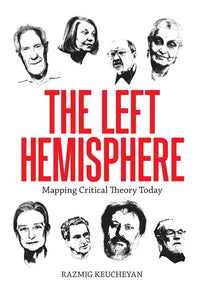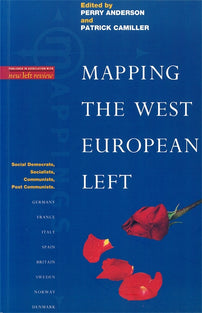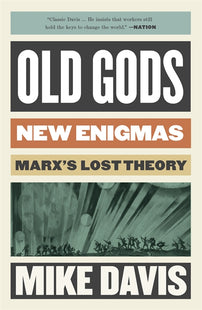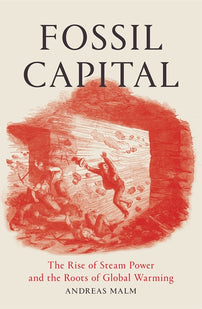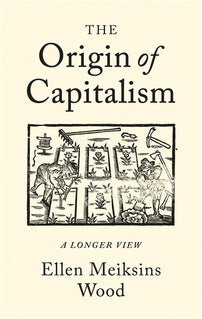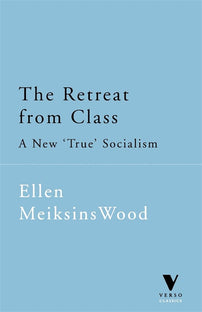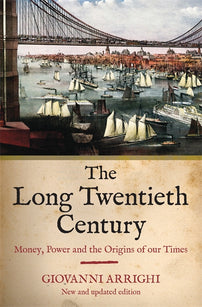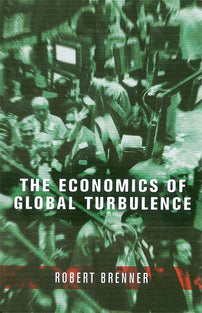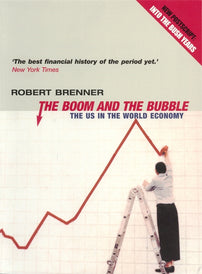Razmig Keucheyan: "You can try very hard to forget about the existence of capitalism. But capitalism will not forget you."
In conversation with Juan Dal Maso, Razmig Keucheyan discusses twenty-first century critical theory, the need for strategic thinking, and the Marxist perspective on the environmental crisis.

First published in Spanish in Ideas de Izquierda Semanario.
The subtitle of your book The Left Hemisphere is Mapping Critical Theory Today. Why do you think “mapping” is of strategic importance today for the left?
On the battlefield, an army needs good maps. A map tells you where your opponent is located, who he is, his strengths and weaknesses, hence how to attack. A map should also provide information about the terrain, what it is made of, and its potentialities. Waging war in cities or a jungle, for instance, requires different battle plans and armament.
Of course, only in Jorge Luis Borges’ fiction is a map an exact reproduction of reality. A map is by definition an approximation or a simplification. Representing a complex reality in simplified terms is its very purpose. Moreover, for the same reality, several maps can coexist, with different functions.
Mapping, in sum, is a condition of strategy. This is why it was always controlled by the State and the military.
Mapping theories, and especially critical theories, is part of the more general endeavor of mapping the current political conjuncture. Obviously, things didn’t go well for the left — the reformist or revolutionary left — during the twentieth century. The very idea of revolution is in crisis — which doesn’t mean it is no longer relevant. It still very much is, in my opinion.
One has to be lucid and admit that forces and theories of the left are now in a process of reconstruction that may take time. The twenty-first century is like an unknown continent to us, and we should try to represent this new battlefield with accurate maps. This is what I try to do in my book The Left Hemisphere.
Contemporary critical theories are numerous. We are witnessing a process of fragmentation of critical theories. This reflects the fragmentation of political “subjects” going on since the 1970s at least. Since the birth of the working-class movement in the first half of nineteenth century, the proletariat was central on the left as an operator of social and political change. It always coexisted with other “subjects." Their political influence, however, was less important.
Today, the working-class still exists of course, but its political centrality on the left has weakened. Moreover, it is more diverse from a professional and an ethnic point of view, which renders its political representation more difficult.
Other movements — the women’s movement, or civil rights and antiracist organizations, for instance — have gained momentum. And so have theories that put these movements at the center of their view of the modern world.
One of the flaws of contemporary critical theories you underline in your book is the weakness of strategic thinking. Do you think the crisis of capitalism that began in 2008 could induce changes from this perspective?
Since the 1980s, non-Marxist critical theories were riding high: poststructuralisms, cultural studies, postcolonial studies, Axel Honneth’s theory of recognition (third-generation Frankfurt school), Jacques Rancière’s radical egalitarianism, etc. In the critical theories of the twentieth century, Marxism in various forms used to be hegemonic in many countries. But it no longer is.
These non-Marxist critical theories are very different from one another. However, they share at least two assumptions. First, class ceases to be central in their view of the modern world. It is sometimes completely absent, or of secondary importance.
Second, these theories are mistrustful of any form of “totalizing," of representing the modern world as a coherent “system” of any sort. This explains why the concept of “capitalism” is nowhere to be found in them.
Now, you can try very hard to forget about the existence of capitalism. But capitalism will not forget you. In other words, capitalist exploitation and alienation are alive and well. The crisis that began in 2008, which is part of an “organic crisis," as Gramsci would say, and which is still going on, made this abundantly clear.
This crisis is provoking a shift in the relations of force between critical theories. Postcolonial theory or Jacques Rancière, for instance, simply don’t have much to say about the crisis of capitalism. This is because they don’t have much to say about capitalism itself. Today, who are the theorists who help us understand the dynamic of the crisis? Leo Panitch, Nancy Fraser, Robert Brenner, Perry Anderson, Ellen Meiksins Wood, Anwar Shaikh, Giovanni Arrighi, Claudio Katz, Mike Davis, Gérard Duménil… all of them Marxists of some kind or another.
Hence, I think we will be witnessing a “return of Marxism” in the years to come. When Marxism returns, however, it never returns in the same forms as in the past. The history of Marxism shows that while retaining the central aspects of the Marxist worldview, it undergoes a process of conceptual mutation, which enables it to grasp the main elements of the new conjuncture.
For instance, there is a theory of finance in Marx and classical Marxism. In his book Finance Capital, published in 1910, Rudolf Hilferding has developed an approach that is still relevant today. But it is clear that the financialization of capital since the 1970s requires that Marxists go to work to understand the workings of this particular phase of capitalist history. And this is precisely what many contemporary Marxists have done. Marxists should cherish the intellectual treasures of their tradition, but also be ready to innovate in the face of new developments.
In many contemporary critical theories, the working class is no longer the central “subject of emancipation." However, even if the starting point of many social movements today is no longer class but gender or race, the members of these movements share a common material condition. In other words, whether they are aware of it or not, they are part of the working-class. In your opinion, could these movements converge in the future and revitalize working-class politics?
Absolutely. As Stuart Hall used to say, in some historical contexts, race is the way class is subjectively experienced by certain segments of the popular classes. The same could be said of gender, and other forms of political identifications. This is not to say, however, that all social relations in the modern world can be reduced, “in the last instance," to class. Race and gender have a “relatively autonomous” dynamic of their own. But this means that all of the oppressed share a material interest in building a common movement. Hence, the workers movement is here to stay, no doubt, even if it is undergoing a profound crisis since the end of the twentieth century. It underwent many crises during its long history.
The hard questions for us today include the following. First, will the center of gravity of the workers movement in the twenty-first century be located in the Global South or remain in the North? Powerful working-class movements are on the rise in China, India, South Africa, or Brazil, with national specificities. On the other hand, in the US and some European countries, “democratic socialism” is back on the political agenda, with the Bernie Sanders and Jeremy Corbyn campaigns, or with Jean-Luc Mélenchon in France. These leaders and movements have their limitations, and Marxists should be critical of them. But one also has to recognize that they all speak the language of class in one way or another, often mixing it with other discursive elements.
Second, what kind of political organizations should the workers movement build? During the twentieth century, revolutionary parties have evolved and adapted to circumstances. Operating in a dictatorship or a democracy greatly matters to the type of political intervention the workers movement undertakes. In a word, Lenin’s vanguard party is not Togliatti’s mass party. So, what would the relevant revolutionary political forms be today?
You have written a book about the link between capitalism and nature, entitled Nature is A Battlefield. Could you tell us a bit more about how you conceive of the environmental crisis from a Marxist perspective?
Ecological Marxism is one of the most interesting strands of contemporary Marxism, with authors like John Bellamy Foster, Jason Moore, Daniel Tanuro, Andriana Vlachou, Michael Löwy, James O’Connor, Ted Benton… The capacity to adapt to the intellectual challenges of a new epoch is the main criterion by which one can judge the vitality of a political tradition. And I think it is quite obvious that Marxism has passed this test. Theoretically, Marxism seems to me to be at its most interesting today. The problem is that it has lost its political influence on the popular classes. The connection between theory and practice that is so vital to Marxism has weakened, and in many countries it has completely disappeared.
There are two ways of seeing the relationship between Marxism and the environmental crisis. Both are interesting. The first one is to go back to reading Marx and the Marxist tradition, and to demonstrate that they had a pretty clear awareness of the ecological disasters brought about by capitalism. This, for instance, is what John Bellamy Foster does in his wonderful book on Marx’s Ecology.
Or one can use Marxist categories — value, class, fetishism, imperialism… — to make sense of the environmental crisis, in a more empirical way. This often requires adapting them to today’s reality, a reality that Marx by definition didn’t know. I have tried to contribute to this second strand of Ecological Marxism with my book Nature Is a Battlefield.
To give you an example: one crucial point, often overlooked, is that the relationship between capitalism and nature is never immediate. It is always mediated by the State. As Marx famously said in the Grundrisse, “The tendency to create the world market is directly given in the concept of capital itself.” However, to circulate throughout the world, commodities need infrastructures: means of transportation and communication, or energy systems. These infrastructures simultaneously destroy and produce nature.
Now, who is responsible for constructing, maintaining, and renewing these infrastructures? The State often is. Hence, the capitalist State should be seen as a powerful nature-producing instrument in the hands of the dominant classes. This instrument’s purpose is to help capitalism expand its logic across the planet, by guaranteeing what Marx called the “conditions of production."
Hence, one of the goals of progressive and revolutionary movements should be to regain control of the State, to democratize it, so as to sever its connection with capitalist valorization processes.
In an article you wrote a few months ago, you wrote that the strikers of Onet were the true heirs of Gramsci. What did you mean by that?
Strangely enough, Gramsci has become fashionable in France in the past four or five years. But fashionable in a bad way. Politicians and mainstream journalists have taken the habit of quoting, or misquoting, certain passages from the Prison Notebooks, especially the ones about the “cultural front," the need to wage a “cultural battle” of ideas, and the ones about “morbid phenomena” appearing in times of crisis.
In France as in other countries, right-wing forces and intellectuals have been interested in Gramsci. Alain de Benoist, the main thinker behind the far-right “Nouvelle droite” (the “New right”) wrote a famous essay in the 1980s entitled “For a Right-wing Gramscianism." In this text, he declares that to reconquer power after the movements of 1968, the right and far-right should first win “cultural” battles. This is the main idea behind de Benoist’s concept of “metapolitics." It is interesting to note that Alain de Benoist has been a major influence on the “Alt Right” movement in the US.
All of these politicians and intellectuals forget the simple fact that Gramsci was a Marxist, and that his perspective on the modern world was class-based. For Gramsci, the “cultural front” cannot be considered separately from the “economic front” and the “political front."
Onet is a French cleaning company. In 2017, some of its employees in the outskirts of Paris went on strike against low wages and bad working conditions. These were not only poor workers, but most of them were recent immigrants in France, some of them undocumented. At the time of the strike, I published an article in Le Monde Diplomatique, saying that had Gramsci been alive today, he would have thrown all his energy in support of these workers. The workers of Onet represent the new working-class we were talking about earlier. Gramsci was always on the lookout for new forms of anticapitalist praxis. The “cultural front” according to him is part of a wider revolutionary strategy whose ultimate goal is to overcome capitalism.
[book-strip index="1" style="display"]